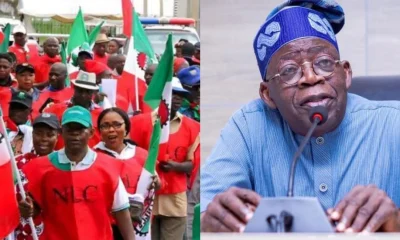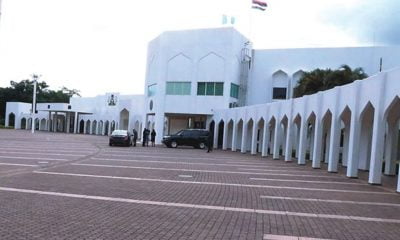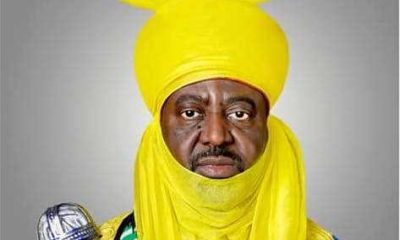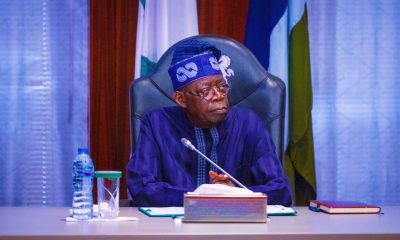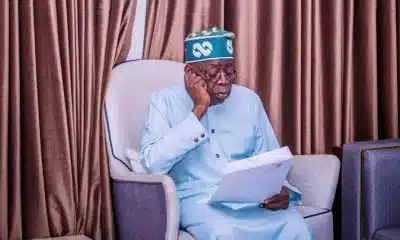Nigeria News
First Anniversary: Tinubu Gives Directives To 47 Ministers On Performance
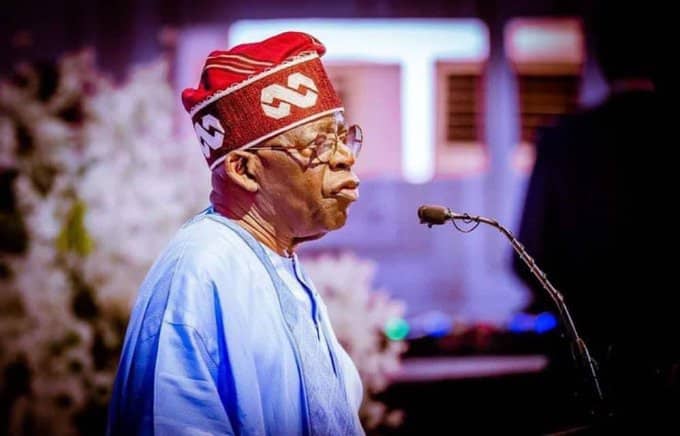
President Bola Tinubu, in commemoration of his first anniversary in office, on Wednesday, directed forty-seven ministers
in his cabinet to present their performance reports to Nigerians.
The directives was relayed by the Minister of Information and National Orientation, Mohammed Idris, during a press briefing in Abuja.
Idris disclosed that the low-key first-anniversary celebration would be marked with sectoral media briefings by the 47 federal ministers starting on Thursday (today).
The Minister was joined at media press conference by the Secretary to the Government of the Federation, Senator George Akume, and the Minister of Budget and Economic Planning, Abubakar Bagudu.
Idris, while speaking on the first anniversary, said there would be no fanfare to mark Tinubu’s one year in power.
He stated, “From tomorrow (today), we are going to have ministers come in here to discuss what they are doing in their various ministries consistent with the policies of President Bola Tinubu.
“The first anniversary of the president will be on a low key, with an emphasis on sectoral briefings by the various ministers. There will be no ceremonies relating to the one year in office of the president.”
Akume, in his statement, highlighted the administration’s ambitious agenda aimed at economic revitalization, social inclusion, and infrastructural development.
The SGF pointed out that significant economic reforms had been implemented to stabilise the economy and promote sustainable growth.
These policies, according to him, have successfully attracted foreign investments, reduced inflation, and boosted job creation across various sectors.
He said, “Let me begin by admitting that the first year in office for Mr. President has been a testament to the unwavering commitment and resilience of this administration towards serving the Nigerian people with diligence, integrity, and dedication.
“Despite daunting challenges, President Tinubu has maintained his calm and demonstrated exemplary leadership qualities, guiding our nation with vision and foresight. The government has implemented significant economic reforms aimed at stabilizing our economy and fostering sustainable growth. Key among these is the introduction of policies that have attracted foreign investments, reduced inflation, and boosted job creation across various sectors.”
The Minister of Budget and Economic Planning, in his address, stated that Tinubu’s administration inherited a low revenue and shrinking economy but was determined to address these challenges through the Renewed Hope Agenda.
This agenda, he added, formed from extensive reflection and input from various stakeholders, focused on eight priority areas crucial for Nigeria’s progress.
Bagudu emphasised the need for difficult decisions, noting that countries Nigeria aspires to emulate made these choices long ago, arguing that the Renewed Hope Agenda involves confronting economic realities, which may cause temporary discomfort but are essential for long-term stability and growth.
He said, “We must restore a macroeconomic environment that can stimulate investment, generate revenue, and address under-investment in sectors like security, education, and social welfare.”
Bagudu highlighted that Nigeria’s current crude oil production is below its Organisation of Petroleum Exporting Countries quota due to under-investment in infrastructure and security.
He further stated, “So we impact, as part of the Renewed Hope Agenda, on a macro-economic reform because that was what was responsible for low investment, low revenues and our economy’s size was shrinking, was too small compared to our needs.
“Nothing we do can solve the problem of under-investment in various sectors of the economy; be it security, be it education, be it social welfare, without restoring a macro-economic environment that can stimulate investment in our economy, which will generate revenues for us to fix security.
“That is why we are not even producing crude oil in the quantity we used to before, or as allowed by international convention, which is our OPEC quota, because of under-investment, whether in the physical infrastructure itself or security, and so on and so forth.”
The minister stated the administration was focusing on food security by investing in irrigation and water management to enable year-round farming, noting that similar efforts were being made to revitalise the livestock sector, which has been a source of conflict rather than economic growth due to historical under-investment.
Enhancements in infrastructure, education, health, the creative economy, the digital economy, and the steel sector are also prioritized, he added.
Bagudu reasoned that some of the government policies might involve some discomfort and pain.
He argued that true leadership involves first and foremost telling the people the truth of their reality.
“Food security, despite our potential, we are under-investing. Most of our farmers are one-season-per-year farmers. So, when you have an asset that you only utilize four months in a year because you don’t have irrigation, you don’t have water bodies.
“Most of our fishing communities, they go to freshwater bodies where there’s no fish anymore, we have to transit them. The livestock sector, which in countries like New Zealand, is an important engine of growth, but in our country, due to cumulative under-investments, it has formed a basis for conflict rather than economic opportunity,” he lamented.
The former Kebbi State governor asserted that the President was committed to fiscal discipline, aiming to reduce the fiscal deficit from 6.11 per cent in 2023 to below 4 per cent in 2024.
He also revealed that the administration planned to increase capital expenditure to 39 per cent, the highest in Nigeria’s history, stressing that the innovative ₦100 billion consumer credit fund and mortgage fund aimed to stimulate manufacturing and housing sectors, respectively.
Bagudu further disclosed that significant budget allocations had been made to national security, leading to improvements in Borno, Imo, Kaduna, and Taraba.
Tinubu, he said, supports local government autonomy, ensuring resources are effectively used to benefit communities.
Bagudu detailed three significant budgets under Tinubu’s administration. He said the first, an ₦819 billion budget, was renegotiated to allocate ₦500 billion for interventions supporting vulnerable populations.
According to him, the second ₦2.17 trillion budget was focused on national security, infrastructure, and cash transfers, adding that the 2024 budget aims to restore fiscal discipline and stimulate economic growth through increased capital expenditure.
The minister said, “The three budgets Mr President participated in the first, the ₦819 billion budget which he inherited, which was even passed into law before he came, he renegotiated with the National Assembly.
“He said ‘I want ₦500 billion to fund intervention that will support the vulnerable populations, who might be affected by the reform measures.’ About ₦200 billion went into agriculture; ₦75 billion into the medium and small enterprise sector, as well as ₦40 billion into the nano-credit sector.
“Equally, another budget of ₦2.17 trillion that went to support gains in national security, most of it to security and infrastructure and also providing more money for cash transfer and meeting commitments to labour.”
The minister pointed out that the President was clear that he would not blame his predecessor for the state of the nation.
Reeling out the benefits of the programmes and policies instituted by the government, he said, “So, we believe that with consumer credit mobilizing the manufacturing sector; with mortgages re-energizing the houses sector; with Agriculture Development Fund mobilizing the agricultural sector, our youth and our productive economy will be mobilised.”
The minister said the ₦130 billion provided for the transition to CNG (compressed natural gas) would restore energy competitiveness and benefit the manufacturing and transport sectors of the economy while the cheaper energy would support economic reforms.

© 2024 Naija News, a division of Polance Media Inc. Contact us via [email protected] or Whatsapp on +2348113851775
